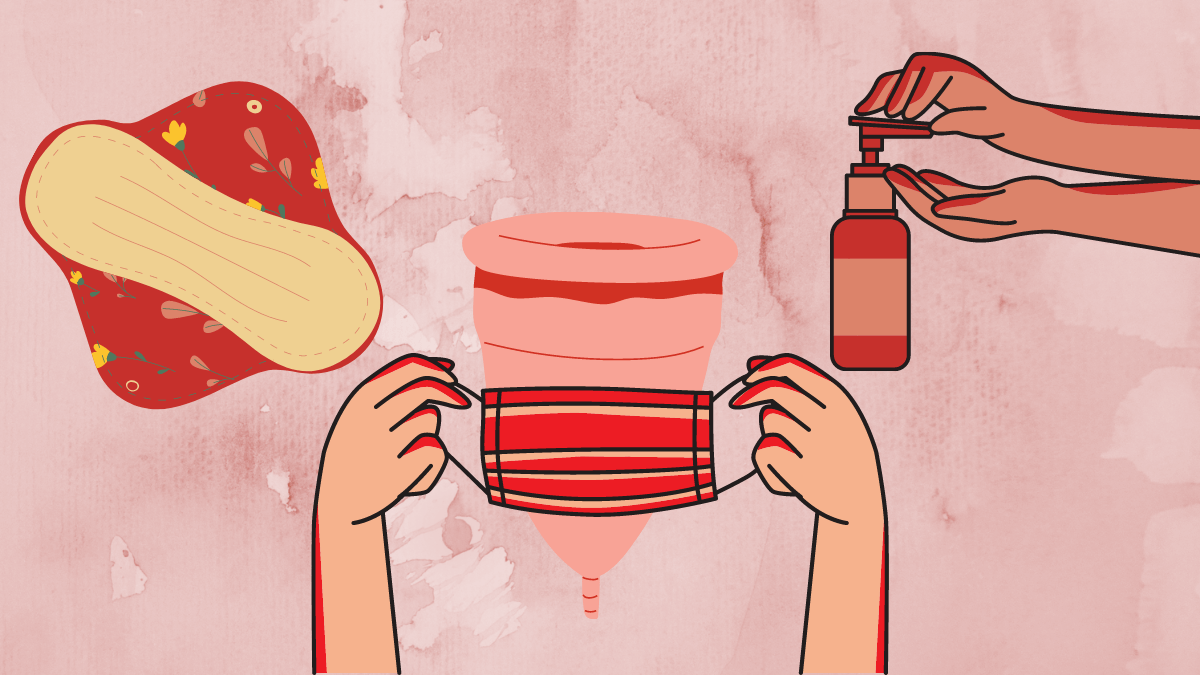India’s 1.3 billion people were ordered to stay in for 3 weeks starting March 24th, 2020, to tackle the spread of coronavirus. However, it soon became clear that this solution did not suit the needs of the nation. One way this fact was demonstrated was by the exodus of over 40 million internal migrants who took to the streets and started crossing borders on foot. The sanitary napkin crisis was another signaling of the unmet needs of over 355 million menstruating women. More than 30% (exclusive of Transgender, Gender Non-Binary menstruators) of our country’s population was left with anxiety and lack of control over their periods.
Enter Menstrual Health and Hygiene NGOs in India. Our country has a well-established network of over 3.4 million NGOs and according to The Central Statistical Organisation of India, there are around four NGOs for every 1,000 people in urban areas and 2.3 NGOs for every 1,000 rural population. This means that a good amount of the population, fortunately, had access to redressal over their MHH concerns.
In this article, we highlight some of the contributions made by MHH organisations and civil society in India during the lockdown and also discuss how they adapted to the COVID landscape.
NGO and Civil Society Interventions
One main reason that the impact of the work put in by most NGOs is far higher than that of the government is that NGOs take a fundamentally different approach—the need-based approach. This bottom-up method is crucial to understand where and how the larger systems (schemes) can readjust to gainfully service its target, even during emergencies.
Myna Mahila Foundation, a Mumbai based NGO which manufactures sanitary napkins and employs women from communities, ran a campaign to disseminate menstrual hygiene lessons through WhatsApp.
Amidst the lockdown, cyclone Amphan had wreaked havoc on the eastern parts of West Bengal, leaving many homeless, injured, and in dire need of help. Anahat, a Kolkata-based NGO having interacted with the communities there, had returned with MHH aid. They distributed kits, each including four cloth pads and one underwear.
“Many told us to give sanitary napkins, but in these areas, they do not use one. Tribal women don’t even use underwear. Giving them sanitary pads means we have to ask them to pay a lot more. They live in forests close to heritage sites, they will be polluting these areas inevitably. We didn’t want to play with all these factors,” says Namrata Karamchandani, Founder of Anahat. They distributed 6000-7000 kits in disrupted areas, like the Sunderbans. This was in collaboration with Paint it Red and the German Consulate which partly funded the initiative apart from other donors and individuals.
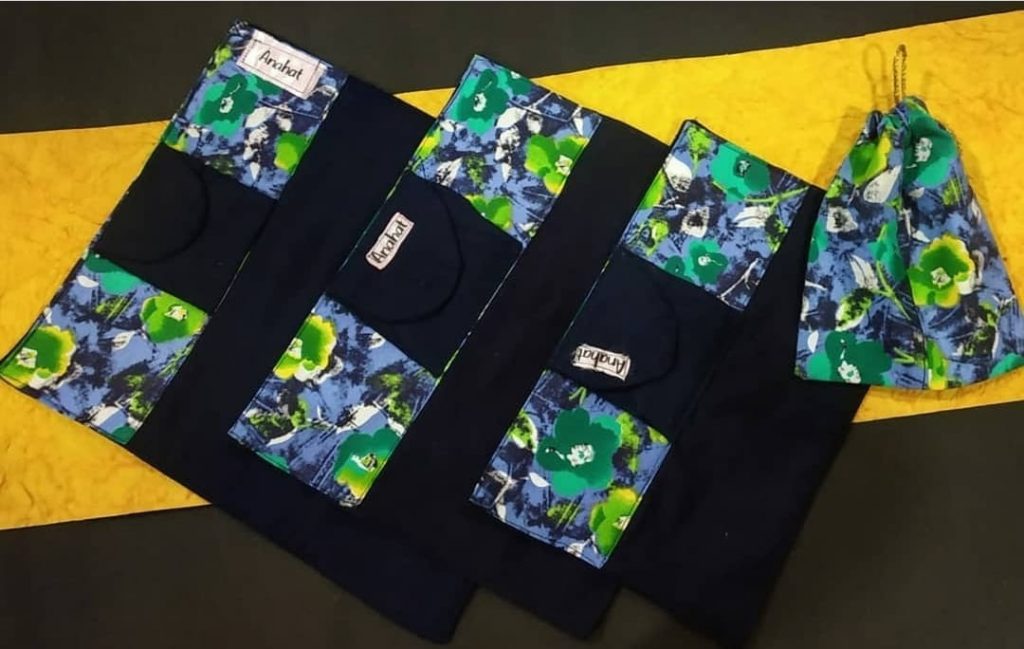
Dr. Sneha Rooh, a palliative physician and the founder of Orikalankini, has started the fundraiser ‘Pads Thats Last – Leave no one Padless’, on Milaap, that aims to collect 99,000 to be able to make cloth pads so that emergencies don’t leave someone padless.
So far, 25 workshops have been conducted in remote and far-flung villages of Kargil and have distributed reusable Cloth pads to 800 young girls, teachers, and Anganwadi workers.
“We are making sure that people have food, medicines, masks but periods don’t stop for pandemics. When there are little savings and no jobs, often a decision arises shall I buy pads or food? This decision, however, is very very silent. The impacts of this decision are only on the menstruator. No one knows. No one needs to know no?” she writes, to encourage people to donate.
This again is a collaboration with Enactus and Mool creations to provide high-quality cotton pad ‘potli’ to women in various rural and conflict conditions. This set consists of 3 cloth pads that cost 150 INR per pack and last beyond the lockdown (up to 2 years when washed and dried in sunlight).
Also read: An Ode To Menstrual Health: Author Nikki Tajri Fights Stigma On…
This is one of the hundreds of fundraisers on platforms like Milaap, that look into meeting MHH needs of underserved communities, especially on creating long-lasting solutions. Anahat had also employed women to manufacture the cloth pads that were distributed in Amphan affected regions. As a result, women earned 15K during a short span of relief work. “This adds significantly to a household that has lost its livelihood. We are very happy and proud that we could have them on board,” Namrata says.
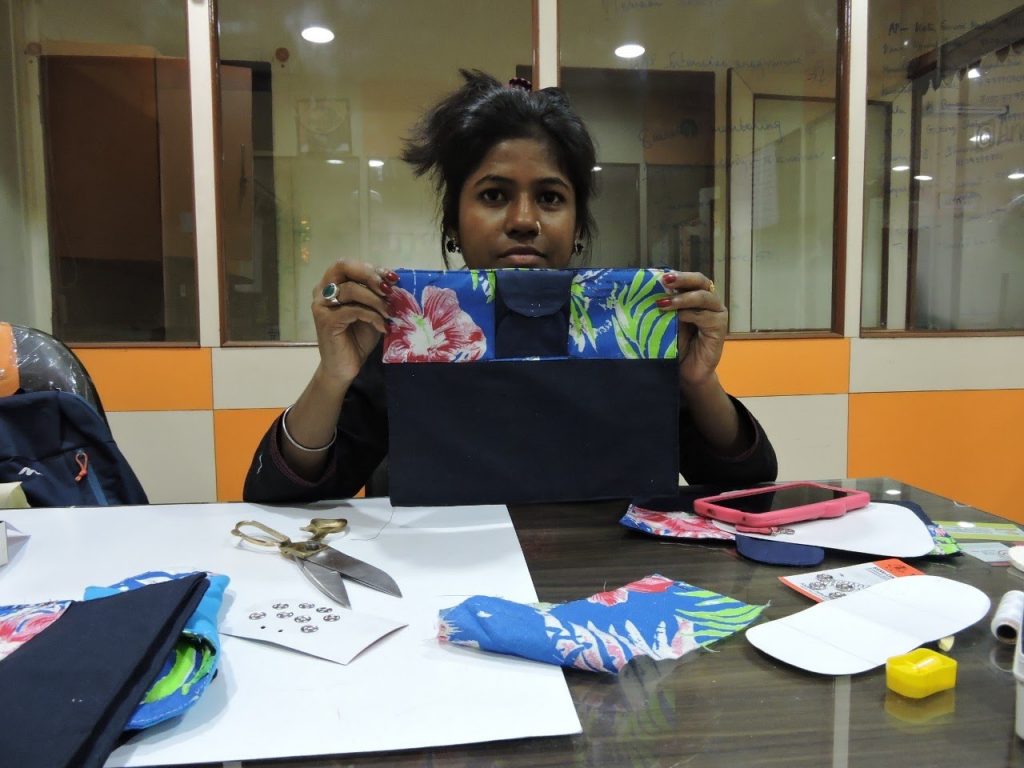
Taking up opportunities to help marginalised communities make their own livelihood and providing them with long term solutions, paint a very promising picture for the welfare of all people. Community engagement is truly the key to building trust between NGOs and civil society. It is also important to foster these relationships for future collaborations.
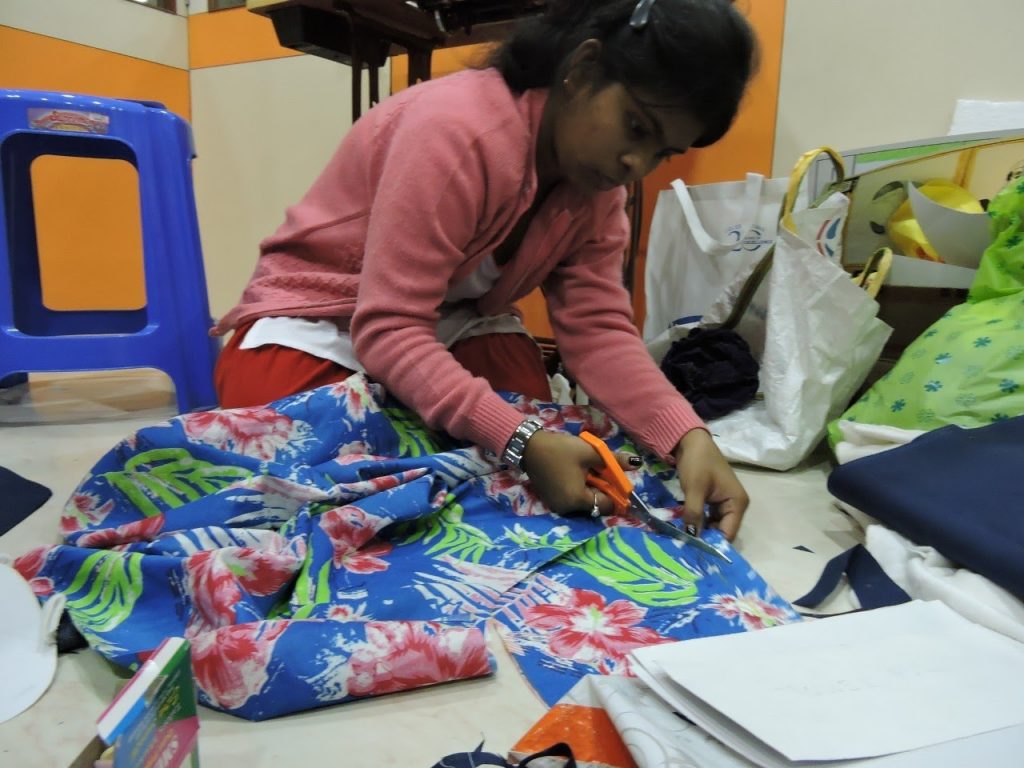
Local government bodies must collaborate with grassroots organisations that will encourage and push for needs-based interventions. While there have been such collaborations in the past, “it just takes some time to reach them.”
Alakshi Tomari, Co-founder of TruCups, for example, has collaborated with UNDP, Himachal Pradesh Govt., Uttar Pradesh Govt., District Commission of Jharkhand and airport authorities in India before the lockdown. “It was not easy to get in touch with these government authorities directly, we have had to go through common connections, people who have collaborated with government authorities via fellowships/ internships etc. Very rarely cold calls work,” she says.
Also read: Period Positivity: What More Can We Do As Menstrual Health Educators?
Rangeen Khidki Foundation in Kolkata, on the other hand, tried reaching out to the local government officials, to various departments over email and received no response. In these emails, Sanjina Gupta, the Founder and Executive Director of Rangeen Khidki Foundation requested that women’s health and hygiene do not take the backseat during emergencies and also explained the possible repercussions if it did. She also suggested ways to ensure that the supply chain is not interrupted.
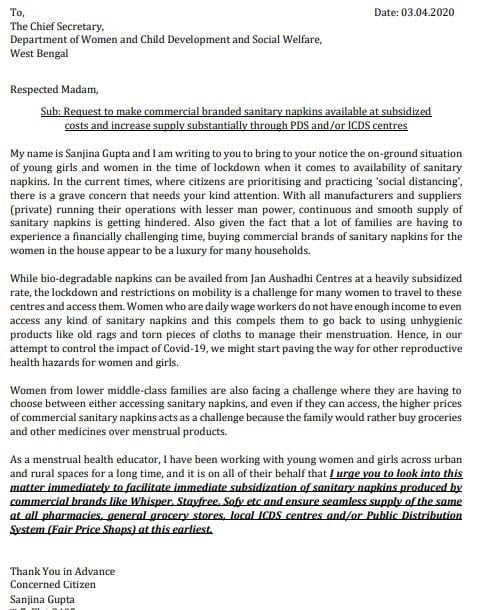
“In West Bengal, at least 3 political parties are always at loggerheads -TMCP, BJP, and CPM. This actually creates challenges to reach people on the ground. Other than that, there was simply no funds being directed to MHH needs. They were being directed for multiple other causes like for example, when the Amphan hit, PM Modi had done a visual survey and denied the State govt itself the funds it requested to rebuild the shore. On the other hand, migrant laborers were coming back as well.”
Irrespective of the support from the government, a number of initiatives have been conducted within the capacities of the NGOs. Myna Mahila Foundation, a Mumbai based NGO which manufactures sanitary napkins and employs women from communities, ran a campaign to disseminate menstrual hygiene lessons through WhatsApp. They also employed an 8 point plan to support the vulnerable with basic ration, sanitary needs, and general health check.
Another Mumbai-based NGO, Kavach – A Movement, made essential kits that included a big packet of sanitary pads, 3 underwears, towel, soap and washing bar. YP Foundation, based in Noida and Delhi based Non-Profit called GOONJ produced instructional videos on how to make cloth pads at home. WAVE, in Ladakh, organised menstrual hygiene workshops in collaborations with other local NGOs and social enterprises like KASCO and Roots Ladakh to improve and ensure menstrual hygiene for girls in Kargil. So far, 25 workshops have been conducted in remote and far-flung villages of Kargil and have distributed reusable Cloth pads to 800 young girls, teachers, and Anganwadi workers.
These are only a few among a thousand of initiatives that civil society responded to MHH needs. Please note Boondh does not have any preferential associations as we highlight some of their work.
Boondh is a social enterprise working in the space of menstrual health, literacy, policy advocacy, and sustainable products. COVID X Menstruation is a series of articles that explores menstrual health and hygiene along multiple intersections like menstrual programming, product supply, government policies, civil society interventions, mental health, and more. You can follow them on Twitter, Facebook and Instagram.
